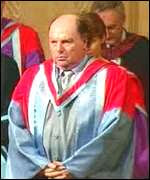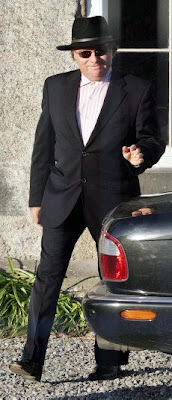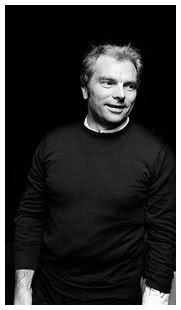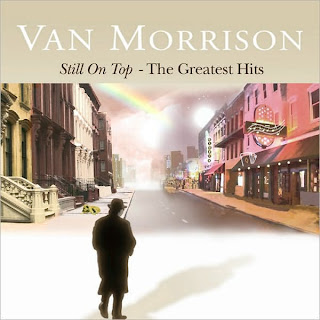Van Should Be Taught In Our Schools (2005)
 Irish Independent
Irish Independent
Originally published in September 2005.
"The end of art is peace and the following of art is little different from the following of religion in the intense preoccupation it demands."
-WB Yeats, 1905
ANOTHER Irish poet, Paul Durcan, once wrote about his experience of hearing Morrison perform a rendition of Patrick Kavanagh's Raglan Road. It was the finale of an open concert outside the Bank of Ireland in Dublin, in 1988.
The choice of song was fitting, Durcan wrote, because it brought together "the two finest poets in Ireland in my lifetime. No other Irish poets - writing either in verse or in music - have come within a Honda's roar of Kavanagh and Morrison."
Durcan, clearly transfixed, continued thus in Magill magazine 17 years ago: "Both northerners - solid ground boys. Both primarily jazzmen, bluesmen, sean-nos. Both concerned with the mystic - how to live with it, by it, in it; how to transform it; how to reveal it. Both troubadours. Both very ordinary blokes. "Both drumlin men - rolling hills men. Both loners. Both comedians. Both love poets. Both Kerouac freaks. Both storytellers. Both obsessed with the hegira - from Monaghan to the Grand Canal, from east Belfast to Caledonia. Both originals, not imitators. Both first-time cats, not copycats. Both crazy.
"Both drumlin men - rolling hills men. Both loners. Both comedians. Both love poets. Both Kerouac freaks. Both storytellers. Both obsessed with the hegira - from Monaghan to the Grand Canal, from east Belfast to Caledonia. Both originals, not imitators. Both first-time cats, not copycats. Both crazy.
"Both sane as sane can be. Both fascinated by at once their own Englishness and their own Irishness. Both obsessed with the audience and with the primacy of audience in any act or occasion of song or art.
"Both fascinated by the USA. Both Zen Buddhists. Both in love with names - place names as well as personal names: Cypress Avenue, Inniskeen Road; San Anselmo, Islington; Boffyflow and Spike, Shancoduff; The Eternal Kansas City, The Rowley Mile; Madame George, Kitty Stobling; Jackie Wilson, Father Mat; O Sole Mio by McGimpsey, John Betjeman on Drumcondra Road."
Before noting that EEC Commissioner Peter Sutherland in a courtroom in 1982 once remarked, "Van Morrison, are they a group?", Durcan wondered whether they might put Van Morrison on the Leaving Certificate poetry curriculum.
"Myself, if I was Minister for Education," Durcan declared, "I'd bring in a new curriculum in the morning and top of my list would be Kavanagh and Morrison."
So would I. Even allowing for exaggeration, the landscape of music would be a lot flatter were it not for east Belfast boy Van Morrison. He chases the same Holy Grail that Yeats and Blake sought.
One night in the Berkeley Court after a concert in 1995, I listened in bona fide awe as Van spoke forth on Blake and Yeats. His love of Blake is undimmed throughout the years. You'd want to be deaf to miss the connection. Van is directly inspired by the visionary poet on You Don't Pull No Punches But You Don't Push The River (on the Veedon Fleece album), Summertime In England (Common One), Ancient of Days (A Sense of Wonder), Let the Slave (A Sense of Wonder), When Will I Ever Learn to Live in God? (Avalon Sunset) and Golden Autumn Day (Back on Top).
Van is directly inspired by the visionary poet on You Don't Pull No Punches But You Don't Push The River (on the Veedon Fleece album), Summertime In England (Common One), Ancient of Days (A Sense of Wonder), Let the Slave (A Sense of Wonder), When Will I Ever Learn to Live in God? (Avalon Sunset) and Golden Autumn Day (Back on Top).
Yeats is another poetic champion to whom Van returns time and time again for inspiration. Listen to Here Comes the Knight (No Guru, No Method, No Teacher), Before the World Was Made (Too Long in Exile) and Rave on, John Donne (on Inarticulate Speech of the Heart).
Say what you like about Van - curmudgeon, grump, whatever - but he has remained true to his muse while those around him in the music sold their souls to Mammon. Van is the music industry's true anti-star - "a maverick not by choice but by conviction", as he once said. If Van Morrison didn't exist, it would be necessary to invent him. The grumpy godhead of Irish soul turned 60 last Wednesday; but he guards his personal life with a missionary zeal, so don't expect to see him and girlfriend Michelle Rocca mugging it up at his birthday bash in the next issue of VIP magazine.
If Van Morrison didn't exist, it would be necessary to invent him. The grumpy godhead of Irish soul turned 60 last Wednesday; but he guards his personal life with a missionary zeal, so don't expect to see him and girlfriend Michelle Rocca mugging it up at his birthday bash in the next issue of VIP magazine.
He has other things on his mind. And apparently always has had . . .
"One time Van said to me that he didn't want to talk," his mother, Violet, once said, "but music was running through his head all the time. He said he didn't know whether he'd been blessed or cursed because the words and music wouldn't leave him."
"Everything is a curse and a blessing," Van told Uncut magazine in a rare interview in June. "There's two sides to everything in life. Don't think I haven't tried to walk away from it all. I've made a few concerted efforts at walking away. But it's pointless. You have to understand that I don't choose the music. It chooses me. My love for the music is the core of it for me.
"Maybe there's people who do music for different reasons. Financial reasons or ego reasons. Maybe they can walk away from it. But I can't. Because my connection to the music can't be broken. This is a need. Let's be clear about this: there is no f***ing choice."
Lets be clear about this. Van Morrison - the lyrical, elegiac bard from east Belfast - is a f***ing genius. Read aloud the following lines from Sweet Thing (1968) and tell me otherwise: "And I shall drive my chariot/ Down your street and cry/ 'Hey, it's me, I'm dynamite/ And I don't know why." Van's It's Too Late to Stop Now, from 1974, is the greatest live album ever recorded. No contest. Astral Weeks, the masterpiece Van wrote when he was a mere 22 yeas of age, is forever up there with Pet Sounds, Blonde on Blonde and Revolver as The Best Album Of All Time.
Van's It's Too Late to Stop Now, from 1974, is the greatest live album ever recorded. No contest. Astral Weeks, the masterpiece Van wrote when he was a mere 22 yeas of age, is forever up there with Pet Sounds, Blonde on Blonde and Revolver as The Best Album Of All Time.
And who could not be mesmerised by TB Sheets, about a woman dying of tuberculosis? "Open up the window and let me breathe," he cries at the deathbed.
The esoteric mysticism of 1972's Listen to the Lion has to be heard to be believed, as Van sings: "We sailed and we sailed and we sailed/ Away from Denmark/ Way up to Caledonia. . . All around the world . . . Looking for a brand new start."
In the end, Van realises the lion he seeks is inside him.
His music, he says, is "aimed at establishing a meditative state within the listener of transcendent moments". He talks about just "picking up what was in the air". You get the impression that Van's spiritual antennae arenever switched off. He once told me that he felt "compelled" to write. He won't thank me for revealing any of this, or the compliments or the high-blown analysis of his genius. "Words on a page," he once sang, "please don't call me a sage."
You get the impression that Van's spiritual antennae arenever switched off. He once told me that he felt "compelled" to write. He won't thank me for revealing any of this, or the compliments or the high-blown analysis of his genius. "Words on a page," he once sang, "please don't call me a sage."
George Ivan Morrison, born August 31, 1945, an only child to Protestant parents, grew up in thrall to Jelly Roll Morton, Woody Guthrie, Muddy Waters, Mahalia Jackson and his "guru", Leadbelly. He talks about hearing Leadbelly for the first time as a four-year-old and how "that opened up the door for me".
Indeed when Van opened the door to me last year the look on his face was priceless. The door was to a spiritual healer's house and I had arrived for an appointment and a man in a cap came out and said a brusque hello before beating a hasty retreat to his car. I recognised the accent and the face 'neath the cap.
On another occasion, in Galway, I sat transfixed as he and Georgie Fame sat up through the night, drinking and talking about old jazz greats, the gods, Arthur Rimbaud and existence in general.
And on another unforgettable night Van intervened to physically pull an off-duty guard off me at a dinner party some years ago. But that story will have to wait for the time being. I'm off to persuade the Education Minister to put a certain wide-eyed east Belfast existentialist on the Leaving Cert poetry curriculum.
It will be a belated present for Van the Birthday Man.
- Barry Egan


































































































































